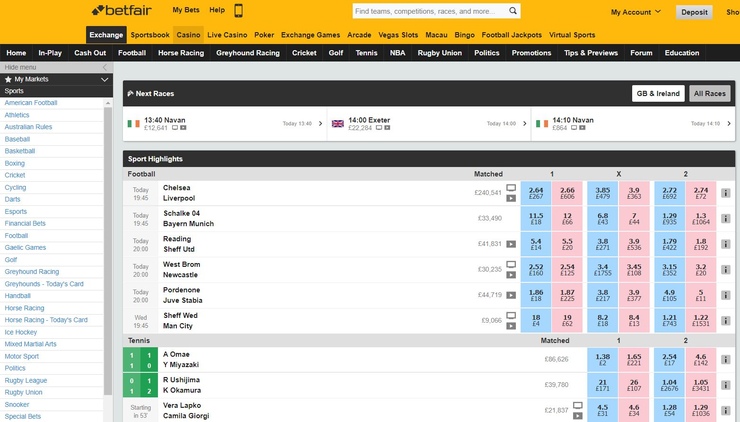Cash out is a betting feature that spread like wild fire after it was invented as a concept by Betfair. It allows you to take a new price offered by the bookmaker given the situation as it now stands, to close your bet early. This means you can either lock in a net win or you can limit losses depending on how the game is going.
In our article about whether cash out prices offer good value, we talked about the fact that the cash out price wasn’t actually all that good in general. This is because you are paying two forms of overround (similar to bookmaker’s fee) on your bet; the first is when you place the bet initially and the second is where you cash out for a lower price than the ‘true odds’.
However, we also went on to say that there are times in football matches where the money that you could bank would overrule the ‘value’ argument of your bet, ultimately meaning you need to look at each scenario individually.
Laying a bet is effectively being the bookmaker, and lay markets can be accessed on betting exchanges such as Betfair and Smarkets. For example, if you put a lay bet on a football team, you are looking for that team to either lose or draw the game for your bet to win. If the team wins, then you would need to pay out at the odds that you initially gave.
It works in a similar way to cash out betting and you can use it to cover other back bets that have been placed. Essentially, when you cash out you are covering your bet to pay out the same for all events and then getting paid out early. When you lay something that has already been backed, you are doing the same. Some people in the industry call it “greening up”, which means you are likely to receive a pay out regardless of the result.
Sports Trading

Before we jump too far ahead, we realise that this is very similar to the process that sports traders use. They back markets initially and then lay them off when the situation changes and the odds dictates; basically, they are taking advantage of the price changes and cashing out.
But the difference here is that the trader will always be willing to lay a bet to limit losses. This means that even if they are going to lose money on a certain bet, they are happy to ‘cash out’ and limit the damage.
For your average punter, very rarely will they use the cash out feature to limit their losses. For example, if they stick a £10 bet on a football match to win and the cash out runs to just £5 as it’s still 0-0 at half time, the average punter will likely just let this run. A trader on the other hand might be looking to cut their losses here and move onto the next one, especially if this has hit their stop-loss for this bet.
Cash Out Rates v Exchange Rates

Referencing our article on cash out value, we found that the majority of bookmakers were charging around 5% in terms of overround for their cash out bets; basically, if the true cash out value was £100, they would offer you £95.
We also need to bear in mind that we’ve paid a certain overround price on the initial bet as well. We worked on a market from BetVictor that had an overround of around 3%, which is actually a pretty good rate. The average for this will be somewhere around 5% or more.
Alternatively, when you use betting exchanges you are paying commission to the exchange instead of an overround. This commission is usually around the 5% mark, but you can find it as low as 2% with some exchanges, and promotions that the exchanges run can lower commission too.
The thing to note here is that you only pay commission at the exchange on winning bets, and this will affect your bottom line differently depending on how you’ve placed your bet.
For example, if you place your initial bet on the exchange and then you lay it off to green up your market and essentially cash out, then you will pay a flat 5% fee on that winning wager.
If you’ve placed a bet with the bookmaker and you then use the exchange to cash out, you will have ‘paid’ the overround on your initial bet and then you will have to pay the commission from the exchange should that bet win as well.
We should make clear that you don’t ‘pay’ the bookmaker in terms of cash here. You pay by the fact that they have adjusted the odds in their favour to cover this overround; so if ‘true’ odds were 2.00, they would offer odds of 1.90 which is 5% less.
It then comes down to the price that you can get from the exchange compared with the price that you can get from the bookmaker. Again, we’ve a full article on this diving into which one is offering the best value.
Lay Betting Requires Cash

If you’ve taken the route of backing with a bookmaker and then laying at the exchange, then you will be aware that you will need ready cash in your exchange account to make this bet. You can’t make it with zero balance and then cover the bet at a later date, you need money in both accounts to make this work.
The extra money you need in your exchange account is called your liability, and this is what you stand to lose if your lay bet loses. It can be substantially more than you stand to win depending on the odds.
This is not the case if you have already backed the bet on the same exchange though. In this case they will adjust the overall return from both bets depending on the amount that you are set to win from each result. Obviously, you will need to have funds to cover any losses if you are looking to lay for a loss, so bear this in min.
Exchange Allows you to Keep Offers Running

Football betting promotions are a huge part of the industry right now and there are plenty of bookies that are offering things like bonuses on first goalscorers who go on to find the net again, or early payouts if your team goes ahead by a certain number of goals.
In fact, the early payout offer would go really well with what we are talking about in this article. With this sort of offer, if you bet on a team that goes 1-0 up you have a couple of options:
- Cash out and secure a net win
- Hope for a 2nd and get paid out early at the full price
- Lay/trade the bet on an exchange
Those first two are simple enough, but the third option, laying the bet on an exchange, is a little trickier to get your head around if you haven’t done it before. You can get up to speed on betting exchange’s here and how they differ from a traditional bookie here. There is even a whole article on the art of laying a bet here.
As a reminder, at this point our current options excluding using an exchange look like this:
| Decision | Locked in Return | Full Potential |
|---|---|---|
| Cash Out | Yes | No |
| Bet Runs | No | Yes |
But there is a way to secure a net win in this scenario without cashing out…
Lay the Bet

We’re going to place a £100 bet on a team to win at 2.00 using the early payout offer. Our total returns for this bet would be £200 if they win.
We also lay this bet for £100 on the exchange at the same price of 2.00, meaning that if the team loses, we lose £100.
Let’s say that our team goes 2-0 up, which means that our early payout bet with the bookie would payout at full price, a return of £200. The back price for the team to win has now shot down to just 1.2. We back it off and this would mean a bet of £166.66.
Let’s run through the scenarios:
If our team wins then we win £100 from the early pay out bet, but we lose the £100 lay bet on the exchange, so we break even. However, given that we have traded the bet with a further £166.66 stake at odds of 1.2, this gives us a return of £33.34. Ultimately, this would be our take home.
If our team ended up losing or drawing, we would still win £200 from the early pay out bet as this was paid out before the game ended when our team were 2-0 up as per the rules of the promotion. We win that bet, but we lose our lay trade of £166.66. Either way, we would still take £33.34 from this bet.
Obviously, there are a few permutations in that the odds can fluctuate and the amount that you lay for might not exactly match up, and you need to consider commission here as well; but the fact is that cashing out bets that have promotions is a really poor choice for these markets, so if you wanted to provide cover then you would be better to do this on the exchange.
Final Thoughts

As with anything to do with cash out betting, the scenario dictates whether its’ best to use cash out or the exchange. If we had to choose then the exchange offers a much more flexible route and is likely going to offer better odds in the long run.
The fact that you can wait to get the price you want and that the exchange price can fluctuate means the punter can get more creative in terms of the amount they want to cash out or the price that they think their current bet is worth. The 5% commission needs to be taken into account, but this can be a lot less than some bookies will charge anyway, plus you know exactly where you stand in terms of the rates, whereas with cash out it’s not always that simple.
Regardless of all this, we do think that you need to make the decision that works best for you and your bet. There are lots of articles that try and scare people into thinking that cash out betting is bad through and through, but it’s not, although punters do need to be aware of the commission that they are going to be paying to the bookmaker when they take this option.
Finally, please check out the articles on the value of the exchanges and the cash out betting value, as they all tie in nicely and will definitely give you a better understanding of the process thus allowing you to make the best decision for your bet.

